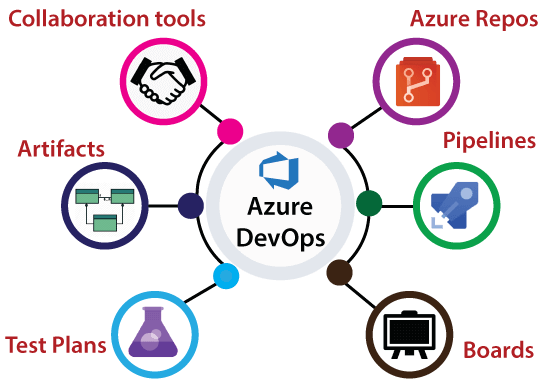What is Azure DevOps course
What is Azure DevOps course: Azure DevOps is a Microsoft Software as a Service (SaaS) platform that offers an end-to-end DevOps toolchain for developing and deploying software. It also integrates with the majority of the market’s leading tools and is an excellent choice for orchestrating a DevOps toolchain. We have many customers at DevOps Group who have discovered that Azure DevOps meets their needs regardless of language, platform, or cloud.

What can Azure DevOps do?
Azure DevOps comprises a range of services covering the full development life cycle. At the time of writing these are:
- Azure Boards: agile planning, work item tracking, visualization, and reporting tool.
- Azure Pipelines: a language, platform, and cloud-agnostic CI/CD platform with support for containers or Kubernetes.
- Azure Repos: provides cloud-hosted private git repos.
- Azure Artifacts: provides integrated package management with support for Maven, NPM, Python, and NuGet package feeds from public or private sources.
- Azure Test Plans: provides an integrated planned and exploratory testing solution.
- Azure DevOps can also be used to orchestrate third-party tools.
Benefits of Azure DevOps :
– Reliability:
Azure DevOps is a SaaS offering that is dependable, scalable, and globally available. It is also backed by a 99.9% uptime guarantee and 24×7 support.
– Access to the most recent features :
Every three weeks, Azure DevOps users gain access to new features. Microsoft is open about its product roadmap and is committed to rapidly iterating on the feature set.
– The upgrade cycle has concluded:
Upgrades are a constant source of frustration for organizations that use on-premises CI/CD tooling. Moving to a SaaS model eliminates the need for patching and upgrading the toolchain.
What is Azure DevOps course Azure DevOps is a mature, feature-rich platform. The variety of supported languages, platforms, and cloud vendors make it a viable option for a wide range of organizations. However, if you are currently running an on-premises Team Foundation Server, migrating to Azure DevOps would be a natural progression.


